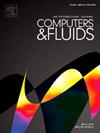Numerical simulation is a well-established way of analyzing compressible flows. Due to high computational demands of solvers for such flow problems, their verification is typically limited to two-dimensional (2D) cases. However, 2D simulations suppress fundamental three-dimensional (3D) aspects of the flow evolution in (compressible) turbulent flows or shock-bubble and shock-drop interactions. With increase of computational power, 3D simulations become more feasible for routine analyses. The verification of 3D simulation frameworks is often limited to transformations of lower dimensional test cases in the 3D space. There is a lack of strictly 3D reference test cases for gas dynamics. In this work, we present a set of genuine 3D Riemann problems in order to validate and verify numerical solvers for compressible flows. The problems are designed such that each octant’s constant initial data connects two neighboring states by an elementary wave only. The problem design is inspired by well-established 2D Riemann problems most prominently posted by Lax and Liu (1998). In contrast to the twenty published 2D cases, more than 300 distinct combinations can be found in 3D. We provide example solutions for the particularly interesting ones of these case combinations and show how the cases help to expose shortcomings of numerical solvers. We provide reference data from computations with an open-source compressible multiresolution flow solver. For the reference solutions, we employ the Harten-Lax-van Leer contact (HLLC) Riemann solver and a weighted essentially non-oscillatory (WENO) reconstruction stencil of fifth order. The reference solutions use an effective resolution of one billion cells. We additionally make the full compute pipeline of this work publicly available, so interested researchers may reproduce and extend the current work.


